Good vision is vital for a fulfilling life, allowing you to experience the world in all its vibrant detail. But did you know that what you eat plays a crucial role in protecting and improving your eyesight? Your eyes, just like the rest of your body, require proper nutrition to function at their best and stay healthy over time.
A well-balanced diet rich in essential vitamins, minerals, and antioxidants can help prevent common eye conditions such as cataracts, macular degeneration, and dry eyes. By making the right food choices, you can slow down age-related vision problems and maintain clear, sharp vision for years to come. In this post, we’ll explore key nutrients that impact vision health, their benefits, and simple ways to incorporate them into your daily meals.
The Connection Between Diet and Eye Health
Your diet is more than just fuel for your body; it also affects the health of your eyes. The nutrients you consume help protect your eyes from harmful light, reduce inflammation, and support the repair of damaged tissues. Certain vitamins and minerals are particularly important for maintaining clear, sharp vision and preventing eye conditions like cataracts, macular degeneration, and dry eye.
Here are some of the key nutrients you need for healthy eyes.
1. Vitamin A: The Vision Vitamin
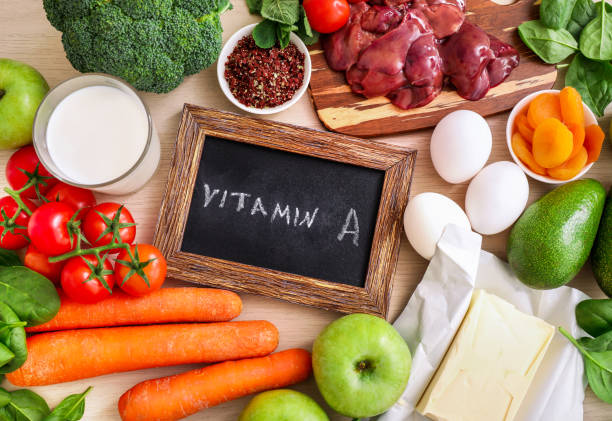
Vitamin A is one of the most important nutrients for eye health. It helps your eyes adjust to light changes and is crucial for night vision. A deficiency in vitamin A can lead to night blindness, which makes it difficult to see in low-light conditions.
Where to find it:
- Carrots
- Sweet potatoes
- Spinach
- Kale
- Eggs
The best sources of vitamin A are colorful fruits and vegetables, especially those that are orange and dark green. These foods are rich in beta-carotene, which the body converts into vitamin A.
2. Vitamin C: Protecting the Eyes from Damage
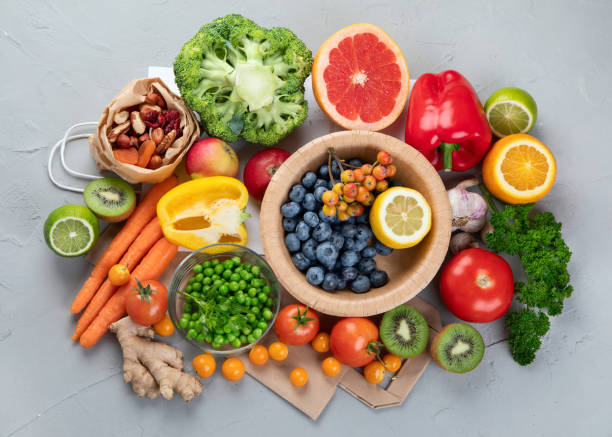
Vitamin C is a powerful antioxidant that helps protect the eyes from free radical damage caused by UV light and environmental toxins. It also supports the production of collagen, a protein that helps maintain the structure of your eye, particularly the cornea and blood vessels.
Where to find it:
- Oranges
- Strawberries
- Bell peppers
- Broccoli
- Kale
Getting enough vitamin C can help reduce the risk of cataracts and slow the progression of age-related macular degeneration (AMD), a condition that affects central vision.
3. Vitamin E: Guarding Your Eyes from Oxidative Stress
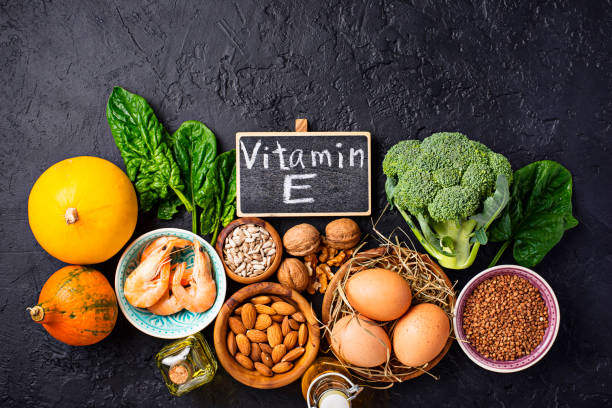
Vitamin E works as an antioxidant, protecting the eyes from oxidative stress and damage. It helps protect the lens of the eye from cataracts and can slow down the development of AMD. This vitamin is important for maintaining overall eye health, especially as you age.
Where to find it:
- Almonds
- Sunflower seeds
- Avocados
- Spinach
- Wheat germ oil
Include these foods in your diet to support long-term eye health and reduce the risk of developing cataracts or other age-related vision issues.
4. Lutein and Zeaxanthin: The Eye Protectors
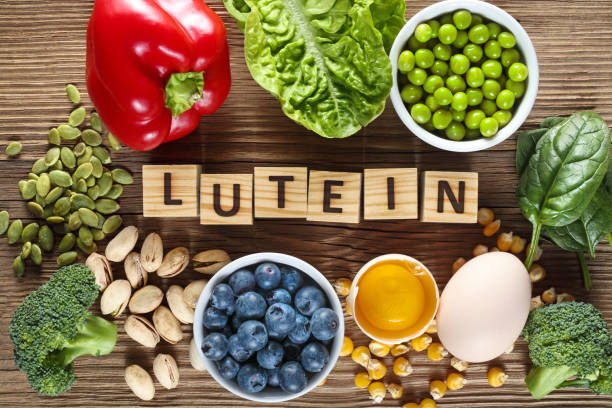
Lutein and zeaxanthin are carotenoids that help filter harmful blue light and protect the retina. They are known for their ability to reduce the risk of macular degeneration and cataracts. These nutrients are naturally found in the eye, particularly in the macula, and are crucial for maintaining healthy vision.
Where to find it:
- Kale
- Spinach
- Eggs
- Corn
- Peas
Eating foods rich in lutein and zeaxanthin helps boost the concentration of these nutrients in the retina, providing additional protection against harmful light.
5. Omega-3 Fatty Acids: Fighting Dry Eyes and Inflammation
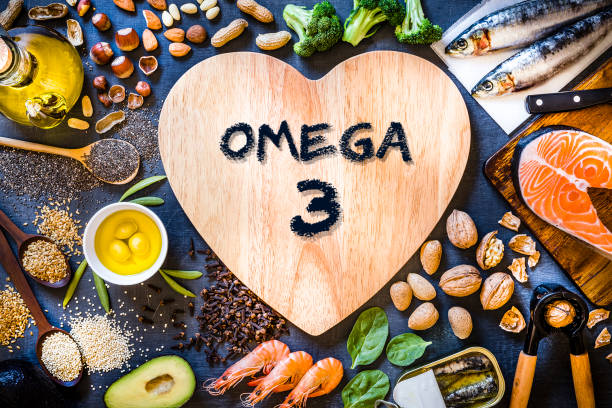
Omega-3 fatty acids are essential fats that play a significant role in maintaining eye health. They help reduce inflammation and can ease the symptoms of dry eye syndrome, which is a common condition that occurs when the eyes don’t produce enough tears. Omega-3s also support the retina and may help prevent age-related vision problems.
Where to find it:
- Fatty fish (salmon, mackerel, sardines)
- Chia seeds
- Walnuts
- Flaxseeds
- Algal oil
If you’re not a fan of fish, plant-based sources like chia seeds and flaxseeds are great alternatives to get your omega-3s.
6. Zinc: Supporting the Retina
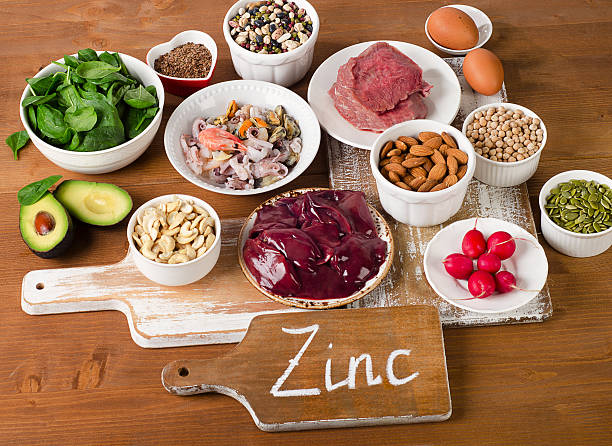
Zinc is a trace mineral that is essential for maintaining the health of your retina and supporting the function of antioxidants in the eye. It also plays a role in night vision and helps with the absorption of vitamin A, which is crucial for overall eye health.
Where to find it:
- Oysters
- Beef
- Chicken
- Pumpkin seeds
- Lentils
Zinc helps prevent macular degeneration and can support better vision as you age.
7. B Vitamins: Protecting Nerve Health
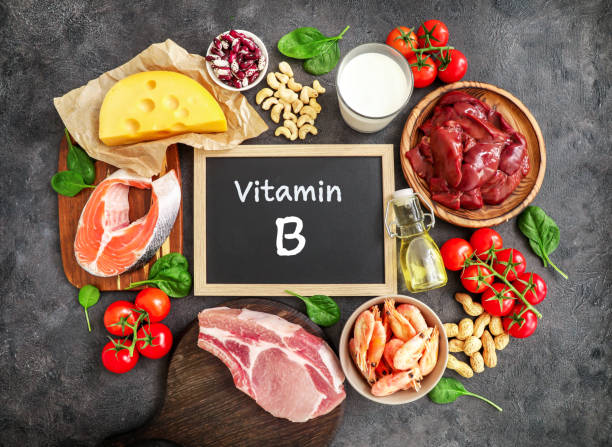
B vitamins, particularly B6, B9 (folate), and B12, help protect the health of the optic nerve and improve blood circulation to the eyes. Deficiencies in these vitamins can lead to a higher risk of developing vision problems, including cataracts and AMD.
Where to find it:
- Leafy greens (spinach, kale)
- Whole grains (brown rice, oats)
- Meat (chicken, turkey)
- Fish (salmon, tuna)
- Beans and lentils
Incorporating more B vitamins into your diet can help support the overall health of your eyes and nervous system.
8. Water: Essential for Hydration

While not a nutrient, staying hydrated is essential for eye health. Proper hydration ensures that the eyes stay moist and are able to produce enough tears to prevent dry eye syndrome. Dehydration can lead to discomfort and even affect the clarity of your vision.
Where to find it:
- Water (of course!)
- Hydrating fruits (watermelon, cucumber)
- Herbal teas
Drink plenty of water throughout the day to keep your eyes hydrated and comfortable.
How to Incorporate These Nutrients Into Your Diet
Now that you know the key nutrients for healthy vision, it’s important to make them a regular part of your diet. Consistently eating nutrient-rich foods can help protect your eyes from damage, reduce the risk of age-related vision problems, and keep your eyesight sharp.
The good news is that incorporating these nutrients into your meals doesn’t have to be complicated. With a few simple changes, you can enjoy delicious, eye-friendly meals every day. Here are some easy and practical ways to boost your eye health through your diet:
- Start with breakfast – Kickstart your day with a nutrient-packed meal. Add spinach and eggs to your morning omelet for a dose of lutein and zeaxanthin, or blend up a smoothie with kale, berries, and chia seeds to get a mix of antioxidants, vitamin C, and omega-3 fatty acids.
- Snack smart – Instead of reaching for processed snacks, opt for vision-friendly choices. Munch on a handful of almonds or sunflower seeds for a vitamin E boost, helping to protect your eyes from oxidative stress and dryness.
- Eat a colorful salad – Make your meals more vibrant and nutritious by including a variety of colorful vegetables. Bell peppers, carrots, and leafy greens provide essential vitamins like A, C, and E, which support eye health and strengthen the retina.
- Cook with healthy fats – Healthy fats improve the absorption of fat-soluble vitamins and provide anti-inflammatory benefits. Use olive oil or avocado oil when cooking to get a good source of omega-3 fatty acids, which help maintain the health of the eye’s tear film and prevent dry eyes.
- Enjoy fish: TEnjoy fish – Fatty fish like salmon, mackerel, and tuna are excellent sources of omega-3s and vitamin D, which are essential for reducing the risk of macular degeneration and keeping your eyes well-lubricated. Aim to include fish in your meals at least twice a week for optimal benefits.
By making these small but impactful changes, you can nourish your eyes and support long-term vision health while enjoying delicious and wholesome meals.
Final Thoughts
Maintaining eye health is about more than just scheduling regular eye exams; it also involves nourishing your body with the right nutrients to protect and support your vision. Just like any other part of your body, your eyes rely on essential vitamins, minerals, and antioxidants to function properly and stay resilient against damage. A well-balanced diet rich in these nutrients can help reduce the risk of common eye conditions such as macular degeneration, cataracts, and dry eye syndrome.
By incorporating key vitamins like A, C, and E, along with minerals such as zinc and omega-3 fatty acids, you can strengthen your eye tissues, improve tear production, and shield your eyes from harmful oxidative stress. Making small but consistent changes to your diet—such as adding leafy greens, citrus fruits, nuts, seeds, and fatty fish—can have long-term benefits for your vision.
Always aim for a balanced diet that includes a variety of colorful fruits, nutrient-dense vegetables, healthy fats, and lean proteins to support not only your eyesight but also your overall well-being. Pairing good nutrition with healthy lifestyle habits, such as staying hydrated, protecting your eyes from UV rays, and avoiding excessive screen time, can further enhance and preserve your vision for years to come.
Remember, a healthy diet isn’t just good for your eyes – it’s good for your entire body! So, start making healthier food choices today to protect your vision tomorrow.

